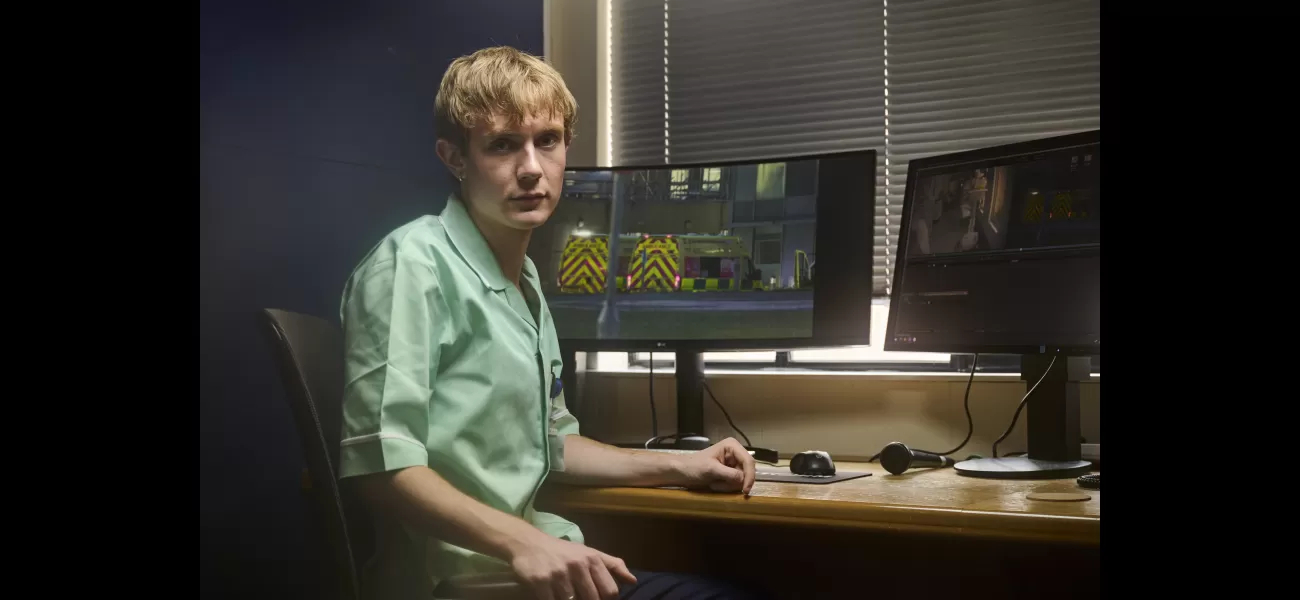I disguised myself to observe a chaotic emergency department in Britain and what I witnessed will stay with me forever.
Basic needs such as food, medicine, and bathroom breaks were frequently neglected for long periods of time.
June 24th 2024.

No one could have prepared me for the reality of working in a hospital. The morning I arrived for my first shift, the alarms were already blaring through the chilly June air. I was nervous, but also excited to be helping out on my first resuscitation. The consultant leading the CPR handed me the patient's bloods to test as my hands shook from the adrenaline and the Red Bull I had consumed to keep me going during my night shift. It was only my twelfth hour of work, but I was already feeling the exhaustion that came with working in such a high-intensity environment.
Working in a hospital was a far cry from my previous experiences with A&E, which had been limited to a bad case of COVID and a broken nose when I was just four years old. However, at the age of 23, I found myself in one of Britain's poorest performing emergency departments. It was quite the change from my previous job as a journalism student in London, but I was recommended for the position by my lecturer due to my interest in healthcare and my part-time job in nurse training.
I was nervous about starting my new job, not just because of the covert camera I would be wearing, but also because of the long hours and intense environment. I took comfort in the fact that I would be starting in April, when the "winter pressures" on the hospital would start to ease. However, during my two-week training course in Telford, I was warned that the hospital faced issues with understaffing, long wait times, and infection control problems all year round.
From the very beginning, it was clear that the hospital was struggling to keep up with the demand for its services. Patients were waiting for hours on end, with some elderly individuals waiting in chairs for up to 30 hours. Ambulances were queuing through the night, and it often felt like we had lost track of where our patients were or what they were waiting for.
Unlike the overcrowded city hospitals I had seen in South London, Shrewsbury was not inundated with hundreds of patients on a typical Friday night. Instead, it was chronically understaffed and under-equipped, leading to a constant state of chaos in the department. Patients and their notes would often go missing, resulting in confusion and delays in their care.
However, amidst all the chaos, there were moments that I found enjoyable. I was able to provide comfort and support to dementia patients and their families, making their difficult days a little bit easier. But there were also moments when I felt completely overwhelmed and helpless. Despite being told that I would shadow another healthcare assistant for the first six weeks, I often found myself alone, trying to juggle multiple tasks at once.
One particular shift stands out in my memory, where I was sent to a makeshift corridor ward with a nurse who was even newer than me. We did our best to provide care for the patients, but we were hindered by the lack of space and equipment. At one point, the nurse had to leave to find pain medication, leaving me alone to care for five patients. One woman was in excruciating pain and kept telling me she couldn't go on, but when I called for help, no one came.
I found myself in tears as I recounted the events of that shift in my daily video diary. It wasn't the only time I cried during my time at the hospital. Surprisingly, it wasn't the traumatic injuries or heart attacks that upset me the most, but rather the loss of dignity suffered by our patients. Despite my best efforts, I always felt like I could have done more. My colleagues told me to grow a thicker skin, as they had been dealing with these struggles for a long time.
One major issue that both patients and staff were unhappy with was the "Fit2Sit" waiting room. This area was introduced as a way to manage hospital capacity, but it often ended up overcrowded with patients who were too sick to be sitting in a chair. There were not enough side rooms for necessary tests and treatments, leading to further delays in care. And the lack of staff meant that mandatory observations were often hours behind schedule.
But perhaps the most concerning issue was the fact that many of the patients in Fit2Sit were not "fit" at all. I saw individuals with serious conditions like strokes and cancer patients receiving active chemotherapy, who needed isolation to keep them safe, sitting in the crowded waiting room.
My colleagues were well aware of the poor quality of care that our patients were receiving. They often expressed frustration with the makeshift corridor ward, the inability to isolate immunocompromised patients, and the lack of proper handovers or bed spaces for ambulances dropping off patients. No one could have prepared me for the reality of working in such a challenging and chaotic environment, but I did my best to provide care and support to those who needed it most.
Working at the hospital was nothing like I could have imagined or prepared for. The sound of alarms ringing through the chilly morning air jolted me awake as I rushed to assist with my very first resuscitation. The consultant leading the CPR handed me the patient's bloods to test, but my hands were shaking from a combination of adrenaline and Red Bull as I approached the twelfth hour of my night shift.
Prior to this experience, my only exposure to A&E was a bad case of COVID and a broken nose from when I was just four years old. But now, at the age of 23, I found myself working at one of the lowest-performing emergency departments in all of Britain.
It all started when Channel 4 approached me to go undercover at the Royal Shrewsbury Hospital for a documentary. At the time, I was a journalism student in London and my lecturer had recommended me due to my interest in healthcare and my part-time job in nurse training. My role would be that of a healthcare assistant, providing support to patients by feeding, washing, and offering a friendly face during their time in A&E. I would also be responsible for monitoring any signs of deterioration in their condition.
Naturally, I was nervous. Not about wearing a hidden camera, but about the intensity of the environment and the long hours away from my loved ones. I took some comfort in the fact that I would be starting in April, when the "winter pressures" on the hospital typically ease. However, during the two-week NHS training course in Telford, I was warned about the constant challenges faced by the hospital such as understaffing, long waiting times, and infection control issues that seemed to be a year-round problem.
Once I started working, it became clear that we had lost any sense of control over our patients and their needs. Elderly individuals would be left waiting in chairs for over 30 hours, ambulances would queue through the night, and it often felt like we had no idea where our patients were or what they were waiting for.
Unlike the overcrowded city hospitals I was familiar with in South London, the Royal Shrewsbury was not overflowing with patients on a typical Friday night. Instead, it appeared to be severely understaffed and ill-equipped, resulting in a constant state of chaos in the department.
One of the most frustrating aspects of the job was the frequent loss of patients and their records. I vividly remember a woman with a suspected stroke who waited a full day in a chair to be seen by the medical team, only to realize that A&E had never even referred her for treatment. Basic requests for food, medication, and even the use of the bathroom would often be forgotten for hours on end. It was not uncommon for patients to tell me that they would feel safer at home.
Despite the challenges, there were moments that I truly enjoyed, such as comforting patients with dementia and supporting family members who were going through a difficult time. But there were also moments where I felt completely helpless and overwhelmed.
Although I was promised that I would be shadowing another healthcare assistant for the first six weeks of my job, I often found myself alone. On my fifth day, I was sent to a makeshift corridor ward to help a nurse who was even newer than I was. We did our best to provide adequate care, but there was no sink to wash our hands and the beds were lined up so close to the wall that it was difficult to move wheelchairs and other medical equipment around.
I distinctly remember a moment when the nurse left me alone to find pain medication, leaving me to care for five patients by myself. One woman was screaming in agony and I felt completely out of my depth. I called out to a doctor and the Nurse in Charge for help, but they never came. I was so overwhelmed that I cried while recounting the events of that shift in my daily video diary. Unfortunately, this was not the last time I found myself in a similar situation.
To my surprise, it was not the traumatic injuries or heart attacks that affected me the most, but rather the loss of dignity our patients experienced. Despite working as hard as I could, I always felt like I should be doing more. My colleagues told me that I needed to develop a thicker skin, and I could sense that they had been battling these challenges for a long time.
One major issue that both patients and staff were frustrated with was the "Fit2Sit" waiting area. This was a space for patients who were ill enough to be admitted to the hospital, but deemed "well enough" to sit in a chair. Although it was initially introduced as a solution to hospital capacity issues, it quickly became overcrowded and chaotic. There were not enough side rooms for necessary tests and treatments, which further delayed the care our patients received. We also faced shortages of equipment and staff to properly monitor patients, resulting in mandatory observations falling hours behind schedule.
But perhaps the most concerning aspect of Fit2Sit was the fact that many of the patients there were not actually "fit" to be sitting in a chair. I saw individuals with conditions ranging from suspected strokes to cancer patients undergoing chemotherapy, who needed isolation to keep them safe.
The staff at the hospital were well aware of the poor quality of care our patients were receiving. My colleagues often complained about the use of the corridor "ward", the lack of isolation for immunocompromised patients, and the constant pressure to offload patients from ambulances without proper handovers or available bed spaces. It was a constant battle to provide the level of care that our patients deserved.
As I reflect on my time at the Royal Shrewsbury Hospital, I realize that nothing could have prepared me for the reality of working there. It was an eye-opening experience that showed me the challenges and struggles faced by our healthcare system, and the need for significant improvements to be made.
Working in a hospital was a far cry from my previous experiences with A&E, which had been limited to a bad case of COVID and a broken nose when I was just four years old. However, at the age of 23, I found myself in one of Britain's poorest performing emergency departments. It was quite the change from my previous job as a journalism student in London, but I was recommended for the position by my lecturer due to my interest in healthcare and my part-time job in nurse training.
I was nervous about starting my new job, not just because of the covert camera I would be wearing, but also because of the long hours and intense environment. I took comfort in the fact that I would be starting in April, when the "winter pressures" on the hospital would start to ease. However, during my two-week training course in Telford, I was warned that the hospital faced issues with understaffing, long wait times, and infection control problems all year round.
From the very beginning, it was clear that the hospital was struggling to keep up with the demand for its services. Patients were waiting for hours on end, with some elderly individuals waiting in chairs for up to 30 hours. Ambulances were queuing through the night, and it often felt like we had lost track of where our patients were or what they were waiting for.
Unlike the overcrowded city hospitals I had seen in South London, Shrewsbury was not inundated with hundreds of patients on a typical Friday night. Instead, it was chronically understaffed and under-equipped, leading to a constant state of chaos in the department. Patients and their notes would often go missing, resulting in confusion and delays in their care.
However, amidst all the chaos, there were moments that I found enjoyable. I was able to provide comfort and support to dementia patients and their families, making their difficult days a little bit easier. But there were also moments when I felt completely overwhelmed and helpless. Despite being told that I would shadow another healthcare assistant for the first six weeks, I often found myself alone, trying to juggle multiple tasks at once.
One particular shift stands out in my memory, where I was sent to a makeshift corridor ward with a nurse who was even newer than me. We did our best to provide care for the patients, but we were hindered by the lack of space and equipment. At one point, the nurse had to leave to find pain medication, leaving me alone to care for five patients. One woman was in excruciating pain and kept telling me she couldn't go on, but when I called for help, no one came.
I found myself in tears as I recounted the events of that shift in my daily video diary. It wasn't the only time I cried during my time at the hospital. Surprisingly, it wasn't the traumatic injuries or heart attacks that upset me the most, but rather the loss of dignity suffered by our patients. Despite my best efforts, I always felt like I could have done more. My colleagues told me to grow a thicker skin, as they had been dealing with these struggles for a long time.
One major issue that both patients and staff were unhappy with was the "Fit2Sit" waiting room. This area was introduced as a way to manage hospital capacity, but it often ended up overcrowded with patients who were too sick to be sitting in a chair. There were not enough side rooms for necessary tests and treatments, leading to further delays in care. And the lack of staff meant that mandatory observations were often hours behind schedule.
But perhaps the most concerning issue was the fact that many of the patients in Fit2Sit were not "fit" at all. I saw individuals with serious conditions like strokes and cancer patients receiving active chemotherapy, who needed isolation to keep them safe, sitting in the crowded waiting room.
My colleagues were well aware of the poor quality of care that our patients were receiving. They often expressed frustration with the makeshift corridor ward, the inability to isolate immunocompromised patients, and the lack of proper handovers or bed spaces for ambulances dropping off patients. No one could have prepared me for the reality of working in such a challenging and chaotic environment, but I did my best to provide care and support to those who needed it most.
Working at the hospital was nothing like I could have imagined or prepared for. The sound of alarms ringing through the chilly morning air jolted me awake as I rushed to assist with my very first resuscitation. The consultant leading the CPR handed me the patient's bloods to test, but my hands were shaking from a combination of adrenaline and Red Bull as I approached the twelfth hour of my night shift.
Prior to this experience, my only exposure to A&E was a bad case of COVID and a broken nose from when I was just four years old. But now, at the age of 23, I found myself working at one of the lowest-performing emergency departments in all of Britain.
It all started when Channel 4 approached me to go undercover at the Royal Shrewsbury Hospital for a documentary. At the time, I was a journalism student in London and my lecturer had recommended me due to my interest in healthcare and my part-time job in nurse training. My role would be that of a healthcare assistant, providing support to patients by feeding, washing, and offering a friendly face during their time in A&E. I would also be responsible for monitoring any signs of deterioration in their condition.
Naturally, I was nervous. Not about wearing a hidden camera, but about the intensity of the environment and the long hours away from my loved ones. I took some comfort in the fact that I would be starting in April, when the "winter pressures" on the hospital typically ease. However, during the two-week NHS training course in Telford, I was warned about the constant challenges faced by the hospital such as understaffing, long waiting times, and infection control issues that seemed to be a year-round problem.
Once I started working, it became clear that we had lost any sense of control over our patients and their needs. Elderly individuals would be left waiting in chairs for over 30 hours, ambulances would queue through the night, and it often felt like we had no idea where our patients were or what they were waiting for.
Unlike the overcrowded city hospitals I was familiar with in South London, the Royal Shrewsbury was not overflowing with patients on a typical Friday night. Instead, it appeared to be severely understaffed and ill-equipped, resulting in a constant state of chaos in the department.
One of the most frustrating aspects of the job was the frequent loss of patients and their records. I vividly remember a woman with a suspected stroke who waited a full day in a chair to be seen by the medical team, only to realize that A&E had never even referred her for treatment. Basic requests for food, medication, and even the use of the bathroom would often be forgotten for hours on end. It was not uncommon for patients to tell me that they would feel safer at home.
Despite the challenges, there were moments that I truly enjoyed, such as comforting patients with dementia and supporting family members who were going through a difficult time. But there were also moments where I felt completely helpless and overwhelmed.
Although I was promised that I would be shadowing another healthcare assistant for the first six weeks of my job, I often found myself alone. On my fifth day, I was sent to a makeshift corridor ward to help a nurse who was even newer than I was. We did our best to provide adequate care, but there was no sink to wash our hands and the beds were lined up so close to the wall that it was difficult to move wheelchairs and other medical equipment around.
I distinctly remember a moment when the nurse left me alone to find pain medication, leaving me to care for five patients by myself. One woman was screaming in agony and I felt completely out of my depth. I called out to a doctor and the Nurse in Charge for help, but they never came. I was so overwhelmed that I cried while recounting the events of that shift in my daily video diary. Unfortunately, this was not the last time I found myself in a similar situation.
To my surprise, it was not the traumatic injuries or heart attacks that affected me the most, but rather the loss of dignity our patients experienced. Despite working as hard as I could, I always felt like I should be doing more. My colleagues told me that I needed to develop a thicker skin, and I could sense that they had been battling these challenges for a long time.
One major issue that both patients and staff were frustrated with was the "Fit2Sit" waiting area. This was a space for patients who were ill enough to be admitted to the hospital, but deemed "well enough" to sit in a chair. Although it was initially introduced as a solution to hospital capacity issues, it quickly became overcrowded and chaotic. There were not enough side rooms for necessary tests and treatments, which further delayed the care our patients received. We also faced shortages of equipment and staff to properly monitor patients, resulting in mandatory observations falling hours behind schedule.
But perhaps the most concerning aspect of Fit2Sit was the fact that many of the patients there were not actually "fit" to be sitting in a chair. I saw individuals with conditions ranging from suspected strokes to cancer patients undergoing chemotherapy, who needed isolation to keep them safe.
The staff at the hospital were well aware of the poor quality of care our patients were receiving. My colleagues often complained about the use of the corridor "ward", the lack of isolation for immunocompromised patients, and the constant pressure to offload patients from ambulances without proper handovers or available bed spaces. It was a constant battle to provide the level of care that our patients deserved.
As I reflect on my time at the Royal Shrewsbury Hospital, I realize that nothing could have prepared me for the reality of working there. It was an eye-opening experience that showed me the challenges and struggles faced by our healthcare system, and the need for significant improvements to be made.
[This article has been trending online recently and has been generated with AI. Your feed is customized.]
[Generative AI is experimental.]
0
0
Submit Comment





